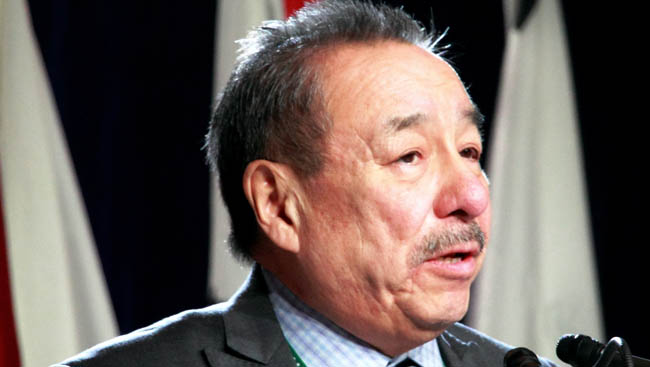First Nation political organizations in Ontario laying off workers as government imposes cuts
Chiefs of Ontario faces 80% chop
Ontario Regional Chief Stan Beardy
By Martha Troian
TORONTO - The Chiefs of Ontario (COO) organization is faced with an 80 per cent cut to its core funding beginning this fiscal year.
Ten employees have already been laid off, with potentially more layoffs to come.
"It is going to have a major impact at the community level," says Stan Beardy, who serves as chair of the COO political confederacy for 133 First Nations in Ontario and Ontario Regional Chief for the Assembly of First Nations. "We've had to shut down our social services, our economic development, youth sectors and trim justice and education."
All positions except for justice and education were laid off because of funding cutbacks from the federal department of Indian Affairs that started during the fiscal year ending March 31st.
The cuts are all part of Indian Affairs changes to the funding model for First Nation, Inuit, and Metis representative organizations across the country announced in Fall 2012.
Indian Affairs INAC) says the cuts were necessary to ensure funding is focused on "shared priorities."
INAC funds five national, 40 Regional Aboriginal Organizations (RPOs) and 78 Tribal Councils. All will see either a 10 percent cut or a $500,000 cap applied to its funding. Prior to the cut, INAC spent $28,246,787 annually funding the 45 national and RPOs. Starting in April, that figure drops by $7 million.
Effective April 1st, some organizations - including the Chiefs of Ontario, the coordinating body and advocate for 133 First Nations in Ontario -will face up to an 80 per cent cutback to their core funding.
In addition, organizations will now have to apply for project funding under six "priority themes" identified by Indian Affairs. According to the Indian Affairs' website, INAC funding for organizations can come from a core funding envelope, from project funding or it may be a combination of the two.
Once successful applicants are approved for project funding, a contribution agreement will be developed between Indian Affairs and the organization. Disbursement of funds will only be released once the agreement is signed.
Indian Affairs says it is one way of offering stable and predictable funding to these organizations, and that the new approach will benefit all parties in terms of predicting workload and reduce the amount of time discussing funding issues.
But the Chiefs of Ontario says if project proposals are not approved by Indian Affairs, further layoffs will take effect.
"What we have seen is a very systematic paralyzation of those supports that First Nations rely on to ensure that we're able to get to the table, advocate, and lobby," says Chief Isadore Day Chief of Serpent River First Nation. "It's vital we have those supports at the very specific levels throughout all of those organizations."
Chief Day, who serves as Lake Huron Regional Chief for the Anishinabek Nation, says the unilateral INAC cuts will "severely impact" the high-level policy work being performed by the Chiefs of Ontario. He said the Harper government's "heartless" approach was in response to criticisms being raised about their performance by First Nations organizations and the Idle No More movement.
Regional Chief Stan Beardy says the funding cuts are part of a an ongoing effort by the Harper conservatives to table legislation that erodes First Nations treaty rights.
He cited Bill C-10, the so-called "Contraband Tobacco Act", as the most current example.
"They are going to criminalize our economic base."
"When we made treaties we never gave up our right to govern ourselves," he added.

